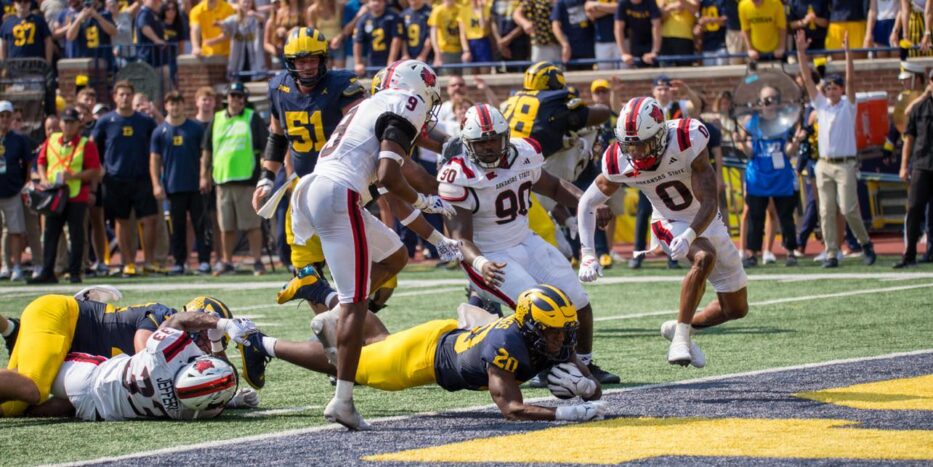In the world of hip-hop, the term ‘for the culture’ is synonymous when one is talking about an action or movement that is meant to establish or better a situation, not just in that moment, but also in moments that might come later down the line.
This Saturday in Ann Arbor will be such an occasion as two of college football’s most storied programs face off for the first time under the banner of the Big Ten Conference.
But for Michigan and USC, the outing will also serve as a chance for these two schools to define the trajectory of their respective cultures.

Lincoln Riley will lead quarterback Miller Moss and USC into the Big House Saturday. (Damien Dennis/The Pit Media)
Heir To The Throne
In their first season as members of the Big Ten, the Trojans faced what many would consider an unenviable task: naming a successor to the former Heisman winner and No. 1 overall pick in this year’s draft, Caleb Williams.
However, under the guidance of Lincoln Riley, USC didn’t display any whiff of uncertainty about who was in line to inherit the responsibility of leading their offense. Even at Big Ten Media Days earlier this summer, Miller Moss was out front and center as a team captain. The redshirt junior had announced his presence to the nation in the Trojans’ Holiday Bowl victory over Louisville last year, where Moss threw for an almost comical 372 yards with 6 touchdowns to 1 interception on a mere 33 dropbacks. The duo of Moss and Riley have largely picked up where they left off at the end of 2023, with the Trojans leading the conference in passing yards per game (336.5) — though they enjoyed a bye in Week 3 heading into the matchup with the Wolverines, who currently rank dead last in the same category (153).
But what’s stood out most for USC through the first three weeks of this season has been their improvements on defense.
Led by defensive coordinator D’Anton Lynn, who came over to the Trojans in the middle of the 2023 season, a program that has long been maligned for its lack of talent and execution on that side of the ball has found itself exceeding expectations. While the sample size is still quite small, USC has allowed an average of 10 pts/gm to opposing offenses (including a shutout against Utah State) and is producing 62 total tackles per outing — a clip that has only been exceeded narrowly by the likes of Oregon and Michigan State. And neither of those teams has a meeting with (much less a win over) a Top 25 opponent to their name, either.
New Philosophies
The Trojans weren’t alone in facing the challenge of finding a new QB for 2024.
Their opponent this week, the defending National Champions, entered the 2024 season as one of four Big Ten schools who saw their starter at the position, JJ McCarthy, taken in the first round of the NFL Draft — joining the likes of Michael Penix Jr. (Washington), Bo Nix (Oregon) and the aforementioned Williams.
But things haven’t been quite as rosy for the Wolverines in that department. After being named the starter through the first three weeks of the season, Michigan head coach Sherrone Moore announced on Monday that Davis Warren was no longer the starter for the Wolverines and would be benched in favor of Alex Orji for the foreseeable future.
This change did not come gently. Through his three games as the starter, Warren has thrown 6 interceptions to only 2 touchdowns, and was averaging less than 150 passing yards. Warren was benched in the Wolverines 28-18 win over Arkansas State late in the third quarter, with Orji largely tasked with ensuring that the wheels didn’t fall off the wagon after his teammate threw their third interception of the day. Alex went 2-of-4 for 12 yards and a touchdown through the air, along with three rushing attempts for 27 yards.
The Wolverines’ decision to install Orji as the starter is more complicated than simply removing one QB in favor of another. In a way, it’s best viewed as the top rung of the action plan when applying triage to the offense as a whole – but additional ailments will need to be treated if Michigan hopes to establish themselves as competitors in the conference they’ve won each of the last three years. Colston Loveland is the primary target on this team, but his status for Saturday is currently a game-time decision, and it wouldn’t surprise anyone if Orji’s ability through the air at this time is less than optimal when you consider he couldn’t win the job over Warren. For Orji and this offense to find success against the Trojans, it will require Michigan to adopt a much more run-heavy philosophy than they’ve demonstrated through the first quarter of the season.
The good news? Donovan Edwards and Kalel Mullings appear to be up to that task.
Change of Colors
So that’s the offense for Michigan, but what about the defense?
When the Wolverines lost Jim Harbaugh to the Chargers, Moore was the program’s choice to take his place as head coach — and they would elevate from within to find his replacement, naming Kirk Campbell the team’s new offensive coordinator. But the same process was not duplicated when Michigan sought out their new defensive coordinator after Jesse Minter followed Harbaugh to Los Angeles. Instead, the Wolverines brought in Wink Martindale, a name known throughout NFL circles and by fans. And while it’s far too soon to hold any indictment on Wink’s ability to coach this defense, it’s probably as good a time as any to point out the differences between what Michigan looked like on defense during its championship run compared to what they’ve done through the first three weeks of this season. In fact, Joel Klatt has already taken on that duty himself.
Klatt, who praised the hiring of Martindale when it was announced last winter, has started to sing a different tune. And it sounds a lot like this: Michigan is blitzing – a lot.
“I think that they’ve been too blitz-heavy,” Klatt commented on his podcast when discussing this week’s matchup with USC. “If the structure of defense from Wink Martindale starts to be manipulated and they try to bring things and pressure and blitz, USC will beat them. If they blitz 50% of the time, which is about what they’ve done to this point in the season, USC will beat them.”
The results of the season would suggest that Klatt has a point. Against Texas, the Wolverines allowed Quinn Ewers and the Longhorns’ offense to convert on 10 of their first dozen 3rd down looks. To avoid a similar fate on Sunday, he suggested that the reigning champs return to favoring their front seven and zone, rather than sending pressure against the Trojans’ offense.
“For me, the blitz rate for Michigan has gotta go from around 50% to back where it was over the last three years, which was about 28%.”
Answers in the Unknown
Ultimately, what will decide this game are factors that – frankly – we just don’t have enough of a sample size (if any) to project out with any certainty. Can Michigan’s offense produce at least 3-4 sustained and fruitful drives against an ascending defense in Orji’s first start? Will the Trojan’s new identity on that side of the ball prove capable of weathering the ground and pound of a Wolverines side that’s likely to register north of forty carries? And can this defense under Wink learn from the harsh lessons of their meeting with Texas in its efforts to get another high-level quarterback off the field sooner rather than later?
The one thing we know for certain is this: It’s the dawning of a new era in the Big Ten.
No. 18 Michigan hosts No. 11 USC on Saturday at 3:30 p.m. EST.




